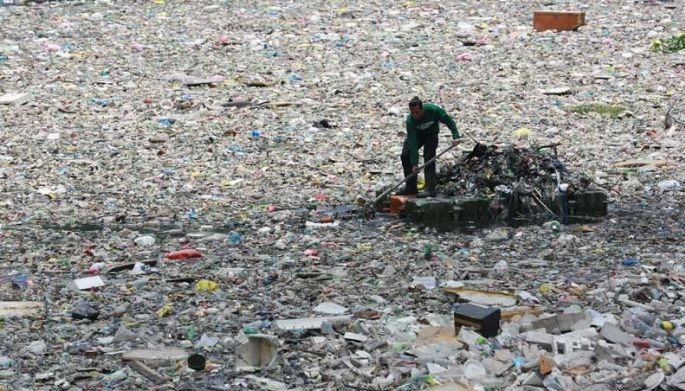Champion rowing team of cancer survivors also battles plastic pollution
CEBU, Philippines — Living a full, inspiring life as a dragonboat team after a cancer diagnosis is one feat that the Cebu Pink Paddlers have ticked off their “To Do” list. But the ladies have taken on another challenge: Advocate and work for cleaner waters.
When the team headed out to the Mactan Channel for their training early Thursday morning, they did not only bring their paddles. They brought along sacks and tongs to pick up trash floating in the waters too.
"We started the clean up drive last October 2019, in line with Breast Cancer Month. We see a lot of garbage during our training so we thought that it’s time to act and give back to the Mother Nature," Coach Christian Ian Sy said.
READ: On World Cancer Day, a champion dragon boat team of survivors creates ripples of hope, courage
On the first day that the Paddlers conducted their clean-up drive, the team filled 21 sacks of trash.
"One time, when we were paddling, we saw the waters filled with floating trash so with our coach, we came up with [the idea] why not [clean?]" said Teofila Ladera, the eldest member of the team.
She added that they even ran out of sacks to put the garbage in.
The trash they pick up from the Mactan Channel ranges from dead animals, to coco husks to used diapers.
But the bulk of the trash that they pick up is plastics: Water bottles, sachets, food wrappers and plastic bags.
Plastics pollution
A recent Social Weather Stations survey commissioned by the Global Alliance for Incinerator Alternatives found that seven out of 10 Filipinos want single-use plastics banned at all times.
Sando bags (71%) topped the list of materials that should be regulated or used less, according to the survey’s 1,800 respondents.
This was followed by plastic straws and stirrers (66%), plastic "labo" bags or transparent plastic without a handle (65%), styrofoam containers (64%), sachets (60%), tetra pack for juices (59%), plastic drinking cups (56%), plastic spoons and forks (54%), plastic bottles for juice (49%) and plastic bottles for water (41%).
Lawyer Gloria Estenzo Ramos, vice president of Oceana Philippines, counts the Cebu Pink Paddlers among their fellow warriors in the fight against plastics pollution.
Ramos said that policymakers should take inspiration from the Pink Paddlers team who continue “to be an active part of the solution in fighting perils of plastics pollution.”
Oceana Philippines is non-governmental organization committed to helping the Philippines “achieve sustainable fisheries and healthy oceans for the benefit of all Filipinos.”
Oceana, citing data from the Global Alliance for Incinerator Alternatives, said that, every year, an average Filipino uses 591 sachets, 174 shopping bags and 163 plastic “labo” bags.
Following this data, the Philippines produces:
- 164 million pieces of sachets daily or 59.7billion yearly
- 48 million pieces of shopping bags daily or 17.5 billion yearly
- 45.2 million plastic “labo” bags daily or 16.5 billion yearly
- 3 million diapers daily or 1.1 billion yearly
Plastics in the non-environmentally acceptable materials list
Ramos said that the government can put a stop to the production of single-use plastics by just including these materials in the list of non-environmentally acceptable materials in Republic Act 9003 or the Ecological Solid Was Management Act of 2000.
Section 29 of the law discusses non-environmentally acceptable products and holds that a product will not be listed as non-environmentally acceptable unless alternatives that are priced no more than 10% of the original product is found.
Greenpeace Philippines, in a February release, pointed out that alternatives to single-use plastics are already available.
Ramos said that the National Solid Waste Management Commission has failed to add plastics to the list, causing a nearly two decades of delay, “a tremendous opportunity loss for the people, our oceans and the planet.”
“It would have saved hundreds of millions of hectares of seabed, corals, sea grass and marine creatures freed from plastics with their devastating consequences,” Ramos added.
Caring for the waters
Pink Paddler Clarisse Marcelino, the youngest in the team, said that they hope to influence communities living near the Mactan Channel to be vigilant about their surroundings.
“This is important to ensure the people living in the surroundings to realize that [our team], who do not even live here, care [for the environment], as they should. How much more for other people?” Clarisse said.
“Hopefully, that leaves an example to the people near the surrounding, that this is your wake up call to making sure that the oceans are clean,” she added.
Editor's note: The trip to Cebu was made possibly with logistical support from OCEANA Philippines, which is campaigning to end single-use plastic that is a major source of pollution in the world's oceans.
At no stage did the host organization have a say on the stories generated from the coverage, interviews conducted, publication date and story treatment. Content is produced solely by Philstar.com following editorial guidelines.
- Latest



























